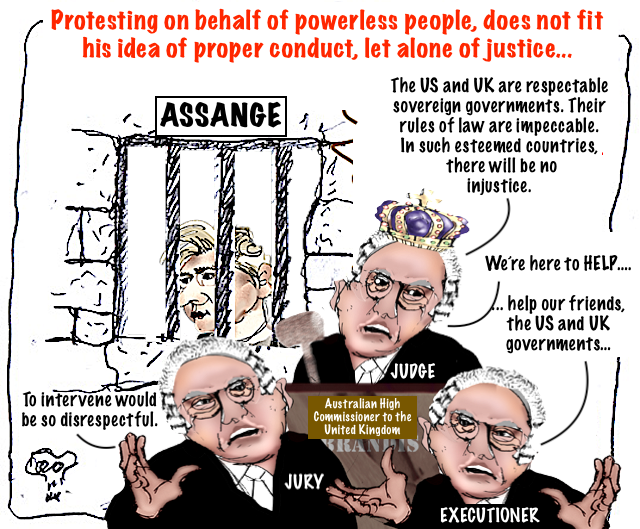Search
Democracy Links
Member's Off-site Blogs
people like brandis make life taste bitter and they poison the air we breathe……….

Appearing on last Thursday’s ABC Q&A programme, George Brandis, former Attorney General and former Australian High Commissioner to the United Kingdom, behaved as though Australian citizens should always be grateful for the way he would protect their interests.
Questioned about his attitude to imprisoned Australian Julian Assange, he insisted on the benefits of siding with powerful establishment interests. To do otherwise, by protesting on behalf of powerless people, did not fit his idea of proper conduct, let alone of justice.
It was a revealing performance. With characteristic pomposity and arrogance, Brandis enthused about values apparently cherished by people like him who moved in prestigious circles. His views on the treatment of Assange came across with more than a hint of menace. He knew how laws should be administered, what politics entailed and how deviants should be treated. There could be few grounds for questioning his wisdom.
BY STUART REES
Asked about his role in paying attention to Julian Assange’s welfare, during the Australian’s three years of imprisonment, he assured the audience that as Australian High Commissioner, ‘I introduced a practice of writing to him (Assange) every month to ask if there was anything more he needed.’
This Brandis brand of bravery provoked derisory laughter from the audience but did not dent the man’s confidence.
He warmed to a script he must have been using ever since law school, or before. Asked whether Prime Minister Albanese should be pressuring President Biden to drop the case against Assange and set him free, Brandis became more energetic in his defence of US and UK systems of government than he had been interested in Assange. The moral probity of these governments could not be questioned. He knew their rules of law, their administration of justice to be beyond question.
Brandis showed little inkling that US politicians had advocated that Assange be killed and that such advocacy could be dubbed the rule of law. Such information could not and should not disturb the mindset of a lofty lawyer, a High Commissioner, a high-ranking officer of the crown.
The question whether an Australian government should intervene on behalf of Julian Assange lit the Brandis vehemence fuse. I thought he might explode. He clasped his hands. His confidence grew. These were respectable sovereign governments. Their rules of law were impeccable. In such esteemed countries, there would be no injustice. To intervene would be disrespectful.
His themes were obvious. Maintain respect and respectability. The high and mighty should enjoy business as usual. Propriety was imperative. You would not pat the Queen at a Buckingham Palace garden party, even if that disrespectful Keating had once disgraced our country by touching her majesty. Maintain distance. Show deference. Be respectable. Trust the establishment. Let the law run its course, even if an Australian citizen might die in jail.
Most of the Brandis response revealed no ability to criticise powerful institutions. His final observations about Julian Assange showed superiority with little room for humanity.
Another Q&A guest, academic Dr. Kylie Moore-Gilbert who had served 804 days in an Iranian jail, insisted that as Julian Assange was a political prisoner, the Australian government should intervene by making representations in Washington and London.
Impatient with Dr. Moore-Gilbert, Brandis interrupted as though she was a junior barrister in his court. He gave his judgment, ‘I don’t believe he’s a political prisoner.’ Then came the repeat of the robot-like assertion that Assange should receive the same consular assistance that any Australian in trouble would obtain.
Even Kylie’s account of Julian’s health and the consequences of being detained for years in a top security prison designed to detain convicted murderers and terrorists, elicited not the slightest touch of compassion. To Dr. Moore-Gilbert’s observation that she knew about the mental and physical consequences of imprisonment, Brandis leapt to the defence of the British by ridiculing the idea that UK jails might have something in common with Iranian ones.
The Brandis tone may have been intended to sound Socrates like but gave the impression of well heeled menace to bolster privilege. By interrupting Kylie Moore-Gilbert’s spirited defence of Julian Assange, he sounded as though he expected to have the last word.
Appearing as an advocate for states which could do no wrong, he insisted that in time honoured judicial systems, we could be certain that Julian Assange was and would be well treated, even if extradited to the US. There was little or no room for criticism. On the contrary, ‘We ought to respect the judicial processes of the UK and the integrity of the US justice system.’
George said so. He knew. Trust wise people. Support powerful politicians and lawyers’ well-insulated systems. Case closed.
READ MORE:
BRANDIS SHOUL BE REMOVED FROM THE POST OF "former" Australian High Commissioner to the United Kingdom... and deprived of his pension.... HE'S A DISGRACE TO THE SPIRIT OF AUSTRALIA — AND HE STINKS of cheap cologne.
FREE JULIAN ASSANGE NOW.......................
- By Gus Leonisky at 22 Jul 2022 - 12:54pm
- Gus Leonisky's blog
- Login or register to post comments
Recent comments
7 hours 12 min ago
7 hours 26 min ago
8 hours 5 min ago
8 hours 40 min ago
8 hours 57 min ago
11 hours 37 min ago
12 hours 19 min ago
12 hours 27 min ago
13 hours 39 min ago
14 hours 55 min ago